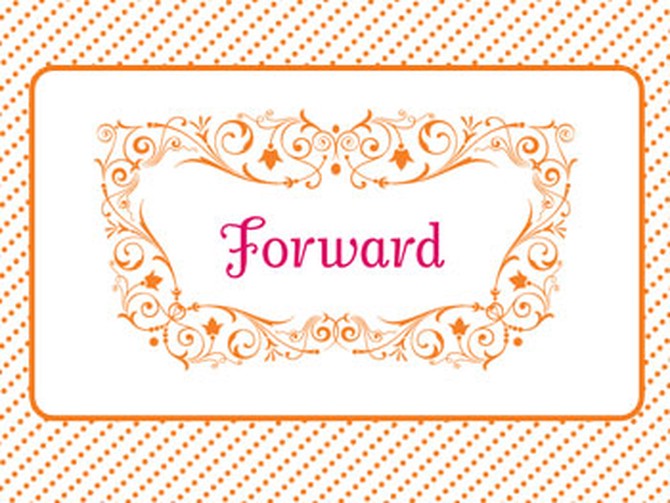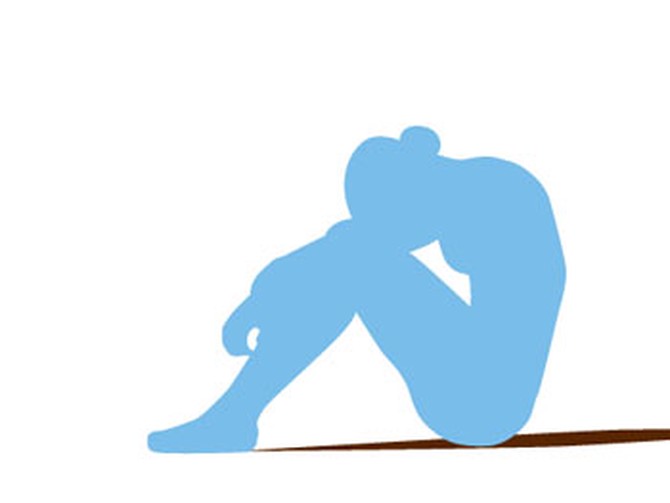6 Mantras to Help You Bounce Back During Hard Times
When things get tough, you have a choice: be weak, or be strong. Get 10 tips on how to make the most of any hard time—with a little help from Karen Salmansohn's The Bounce Back Book.
By Karen Salmansohn

Tip 1: Be a Forward Thinker
Whenever you're tempted to dwell in the past, repeat this single word: forward. Brainstorm one positive thought and action to use to keep you moving forward. When you're tempted to indulge in a negative, regressive behavior, swap it for one that will move you forward.

Tip 2: What You Are Going Through Now Is Normal
What you are going through now is normal.

Tip 3: There Is No Such Thing As Normal
Everyone has times of intense difficulties. These difficulties can be illness, divorce, job loss, miscarriage, ego-shattering failure, heartbreak, assault, physical trauma, betrayal, economic hardship and then some...
Perhaps you recognize yourself a few times in these categories. And that's okay. Even normal. You've been swideswiped.Maybe even frontswiped.
Yes, life comes with a vast array of surprises.
Their aftereffects are equally varied.
Emotional: depression, anxiety, fear, stress, anger, guilt, grief, shame, shaken self-esteem, feeling lost, overwhelmed
Cognitive: poor concentration, shortened attention span, memory problems, difficulties making decisions, recurring thoughts, nightmares, flashbacks
Physical: muscle tremors, chest pain, difficulty breathing, headaches, high blood pressure
Behavioral: withdrawal, increased alcohol consumption, sleep disturbances, changes in eating, disruption of work habits, lack of sexual interest
Recognize: All of these aftereffects are normal reactions.
Recognize: Just as physical wounds heal at different rates in different people, so do emotional wounds. Everyone has different needs and speeds.
Bounce Back Assignment: Don't put added pressure on yourself to hurry back to normal. There is no such thing as normal. What's important is that you're nurturing your wounds appropriately. Instead of nudging them to heal so rapidly that you bruise yourself further in the process.
Perhaps you recognize yourself a few times in these categories. And that's okay. Even normal. You've been swideswiped.Maybe even frontswiped.
Yes, life comes with a vast array of surprises.
Their aftereffects are equally varied.
Emotional: depression, anxiety, fear, stress, anger, guilt, grief, shame, shaken self-esteem, feeling lost, overwhelmed
Cognitive: poor concentration, shortened attention span, memory problems, difficulties making decisions, recurring thoughts, nightmares, flashbacks
Physical: muscle tremors, chest pain, difficulty breathing, headaches, high blood pressure
Behavioral: withdrawal, increased alcohol consumption, sleep disturbances, changes in eating, disruption of work habits, lack of sexual interest
Recognize: All of these aftereffects are normal reactions.
Recognize: Just as physical wounds heal at different rates in different people, so do emotional wounds. Everyone has different needs and speeds.
Bounce Back Assignment: Don't put added pressure on yourself to hurry back to normal. There is no such thing as normal. What's important is that you're nurturing your wounds appropriately. Instead of nudging them to heal so rapidly that you bruise yourself further in the process.

Tip 4: Feeling Means You're Dealing Means You're Healing
I was experiencing many of the same emotions after my sexual assault that Elisabeth Kübler-Ross describes in her five stages of accepting the death of a loved one. The only difference is that, with death, you at least get the perk of being brought some yummy casseroles.
Kübler-Ross outlines the five stages of grief as follows:
Stage #1: Denial and isolation:
"This is not happening to me."
Stage #2: Anger:
"How dare this happen to me."
Stage #3: Bargaining:
"Just let me get X and I won't care about Y," or "If this doesn't happen, I promise to..."
Stage #4: Depression:
"I can't bear to face going through this."
Stage #5: Acceptance:
"I'm ready; I don't want to struggle anymore."
If you've been through a personal tragedy, chances are that you too don't want to accept it and let in all the painful emotions—at least for a while.
Psychologist Sharon Wolf believes there is a "core pain" you must be ready to feel during really bad times to fully recover: "If you want to heal rightly from a crisis, be ready to tolerate more pain than you thought you could ever feel," warns Wolf.
Thankfully, Wolf promises if you learn to sit with, feel, and tolerate this core pain, it will get smaller and smaller, until it ultimately disappears.
Bounce Back Assignment: If you are avoiding your pain and grief as I tried to do, remind yourself:
Kübler-Ross outlines the five stages of grief as follows:
Stage #1: Denial and isolation:
"This is not happening to me."
Stage #2: Anger:
"How dare this happen to me."
Stage #3: Bargaining:
"Just let me get X and I won't care about Y," or "If this doesn't happen, I promise to..."
Stage #4: Depression:
"I can't bear to face going through this."
Stage #5: Acceptance:
"I'm ready; I don't want to struggle anymore."
If you've been through a personal tragedy, chances are that you too don't want to accept it and let in all the painful emotions—at least for a while.
Psychologist Sharon Wolf believes there is a "core pain" you must be ready to feel during really bad times to fully recover: "If you want to heal rightly from a crisis, be ready to tolerate more pain than you thought you could ever feel," warns Wolf.
Thankfully, Wolf promises if you learn to sit with, feel, and tolerate this core pain, it will get smaller and smaller, until it ultimately disappears.
Bounce Back Assignment: If you are avoiding your pain and grief as I tried to do, remind yourself:
- Fear of pain is often worse than the pain itself. When the pain starts to seep through your consciousness, let it come. Don't fight those tears. If possible, give yourself specific times to grieve. (By the way, as an unexpected perk, crying is better than getting a facial in removing toxins for clear, growing skin.)
- Because feeling your core pain is scary, you might be tempted to seek comfort by numbing yourself—with alcohol, sleeping pills, or other addictive substances. Be strong. Resist and persist in allowing your true pain to surface.
- You are an unfinished self in process. Like to many of life's challenges, experiencing and overcoming pain can reveal emotional depths and perspectives you didn't know you were capable of.
- Keep a journal. Track your healing process through the five stages (you may skip some stages and also regress or cycle back), but a journal will show you that progress is being made. And remember, after you pass through stage 4, that final stage of Acceptance is right around the corner. Whew!

Tip 5: Turn Over a New Belief
"Experience is not what happens to a man; it is what a man does with what happens to him." —Aldous Huxley
"We are what we think. All that we are arises with our thoughts. With our thoughts, we create our world." —Buddha
"Drugs are not always necessary, [but] belief in recovery always is." —Norman Cousins
"Things do not change, we change." —Henry David Thoreau
"Man's mind stretched to a new idea never goes back to its original dimensions." —Oliver Wendell Holmes Jr.
"The best is yet to come." —Frank Sinatra
Bounce Back Assignment: Let better beliefs grow strong.
"We are what we think. All that we are arises with our thoughts. With our thoughts, we create our world." —Buddha
"Drugs are not always necessary, [but] belief in recovery always is." —Norman Cousins
"Things do not change, we change." —Henry David Thoreau
"Man's mind stretched to a new idea never goes back to its original dimensions." —Oliver Wendell Holmes Jr.
"The best is yet to come." —Frank Sinatra
Bounce Back Assignment: Let better beliefs grow strong.

Tip 6: Think Like a Lion
A star lion tamer with Barnum & Bailey Circus, Graham Tomas Chipperfield, got bitten by Sheba, one of his 500-pound lionesses.
Before the mauled tamer got back into the cage, he made very sure to see what happened from Sheba's point of view. He recognized how lions tend to think of the trainer as another lion. And so when he bounded into the cage to break up a fight between Sheba and another lion, Sheba merely figured Chipperfield wanted to join in the fight too.
Did Chipperfield sit around blaming Sheba for her inaccurate thinking? No. Instead he took the time to see the biting from Sheba's perspective, so he'd make sure this bad event would not happen again.
Robert Staub, a psychologist who counsels people who have been through failure, would agree with the Chipperfield philosophy. He says that the main cause of career and relationship failure is "not being able to adopt the viewpoint of others."
For this reason, many therapists—beginning with Freud—have clients role-play a situation from the offending party's perspective. The hope is that by understanding why someone might have emotionally taken a bite out of them, the patient can avoid being bitten again!
Bounce Back Assignment: Take the time today to understand your contribution to any bad event you've just been through.
Never, ever put yourself back into the same environment—a marriage, a job, a friendship—until you've fully understood things from "the lion's point of view."
Before the mauled tamer got back into the cage, he made very sure to see what happened from Sheba's point of view. He recognized how lions tend to think of the trainer as another lion. And so when he bounded into the cage to break up a fight between Sheba and another lion, Sheba merely figured Chipperfield wanted to join in the fight too.
Did Chipperfield sit around blaming Sheba for her inaccurate thinking? No. Instead he took the time to see the biting from Sheba's perspective, so he'd make sure this bad event would not happen again.
Robert Staub, a psychologist who counsels people who have been through failure, would agree with the Chipperfield philosophy. He says that the main cause of career and relationship failure is "not being able to adopt the viewpoint of others."
For this reason, many therapists—beginning with Freud—have clients role-play a situation from the offending party's perspective. The hope is that by understanding why someone might have emotionally taken a bite out of them, the patient can avoid being bitten again!
Bounce Back Assignment: Take the time today to understand your contribution to any bad event you've just been through.
Never, ever put yourself back into the same environment—a marriage, a job, a friendship—until you've fully understood things from "the lion's point of view."

Tip 7: Happiness Is a Choice, Not Just a Matter of Genes or Good Luck
According to researchers at The Happiness Project in the U.K., our generic inheritance towards optimism (happiness) or pessimism is only about 50 percent. So with the other 50 percent you're able to make new choices.
Translation: This is good news! It means you control that other 50 percent of your reaction to life's difficulties and can do things to change your happiness level.
Easier said than done, right? Well, positive psychologist Dr. Jonathan Haidt has devised a very useful formula for how to be happier:
H = S + C + V
H = happiness
S = set point for happiness
C = current condition
V = voluntary activities
In other words, your happiness level is a potent mix of how naturally happy you are (that 50 percent figure) combined with whatever's going on in your life right now that affects your happiness, plus those voluntary activities you choose to fill your life with. (There's that word choose again!)
Bounce Back Assignment: If your happiness level isn't registering high enough because current conditions are dragging you down, forget about what you can't control and focus on those V's. Those Voluntary activities.
Decide to add more "ING" to your life. By "ING" I mean runn-ING, hik-ING, cook-ING, salsa danc-ING, cycl-ING, paint-ING, do-ING the things that make you happy. Whatever they are, make sure they make you feel Vital, Vibrant, Va Va Voom, Victorious!
Translation: This is good news! It means you control that other 50 percent of your reaction to life's difficulties and can do things to change your happiness level.
Easier said than done, right? Well, positive psychologist Dr. Jonathan Haidt has devised a very useful formula for how to be happier:
H = S + C + V
H = happiness
S = set point for happiness
C = current condition
V = voluntary activities
In other words, your happiness level is a potent mix of how naturally happy you are (that 50 percent figure) combined with whatever's going on in your life right now that affects your happiness, plus those voluntary activities you choose to fill your life with. (There's that word choose again!)
Bounce Back Assignment: If your happiness level isn't registering high enough because current conditions are dragging you down, forget about what you can't control and focus on those V's. Those Voluntary activities.
Decide to add more "ING" to your life. By "ING" I mean runn-ING, hik-ING, cook-ING, salsa danc-ING, cycl-ING, paint-ING, do-ING the things that make you happy. Whatever they are, make sure they make you feel Vital, Vibrant, Va Va Voom, Victorious!

Tip 8: Get Some ZZZZZZ's
Get some ZZZZZZ's.
Bounce Back Assignment: Try these insomnia busters.
Meditate
Avoid Illuminated Alarm Clocks
Drink Herb Tea or Warm Milk
Don't Use Your Bed for TV or Reading
Don't Take Naps
Visualize Boring Things
Visualize Peaceful Things
Wake Up Earlier
Avoid Caffeine, Alcohol, and Tobacco
Exercise During the Day
Sleep Facing North
Pop a Tryptophan
Bounce Back Assignment: Try these insomnia busters.
Meditate
Avoid Illuminated Alarm Clocks
Drink Herb Tea or Warm Milk
Don't Use Your Bed for TV or Reading
Don't Take Naps
Visualize Boring Things
Visualize Peaceful Things
Wake Up Earlier
Avoid Caffeine, Alcohol, and Tobacco
Exercise During the Day
Sleep Facing North
Pop a Tryptophan

Tip 9: Think of Life As a Gigantic Ice Cream Parlor With Infinite Flavors to Taste
Bounce Back Assignment: Tell yourself the goal of life is to taste as many flavors of experiences as you can.
RECOGNIZE: Every challenge offers the opportunity to think a new flavor of thought and feel a new flavor of emotion. The more varied the flavors of life you get to taste, the more interesting, layered, educated, and world-experienced you'll be. Admittedly, you won't like every flavor. But hey, you don't need to go near that flavor ever again. Instead, indulge in flavors you know you're passionate about! And don't be afraid to taste something that might look funny—you never know!
RECOGNIZE: Every challenge offers the opportunity to think a new flavor of thought and feel a new flavor of emotion. The more varied the flavors of life you get to taste, the more interesting, layered, educated, and world-experienced you'll be. Admittedly, you won't like every flavor. But hey, you don't need to go near that flavor ever again. Instead, indulge in flavors you know you're passionate about! And don't be afraid to taste something that might look funny—you never know!

Tip 10: Use Vacations As Restorations
Why is it that you often must go away to have important life realizations come a-knockin'? Yes, often the best way to see what's going on in your life is from a distance of a few thousand miles.
I have some theories on why a vacation is perfect for neuron renewal:
Karen Salmansohn is a best-selling author known for creating self-help for people who wouldn't be caught dead reading self-help. Reprinted by permission of Workman Publishing Co., Inc. from The Bounce Back Book by Karen Salmansohn. (c) 2007 All Rights Reserved
More from Karen Salmansohn
I have some theories on why a vacation is perfect for neuron renewal:
- Getting away reminds you: Eureka! You are just one little microdot life in this humongous world, which means you don't have huge problems. You have microdot problems, which only YOU—and YOU ALONE—are in charge of fixing. So you can live the most amazing microdot life imaginable.
- At least for the moment it takes to stare at that amazing painting, church, view, leather pocketbook, chocolate croissant, you're being fully mindful and in the now rather than obsessing about your past difficulties.
- When you change your scenery, you change you thinking energy—and are more apt to see new solutions. You also remove potentially depressing visual triggers that might be keeping you stuck in a negative place.
- Vacations keep you away from phones, newspapers, e-mail, and incoming bills. Duh! This liberation creates much inner celebration!
Karen Salmansohn is a best-selling author known for creating self-help for people who wouldn't be caught dead reading self-help. Reprinted by permission of Workman Publishing Co., Inc. from The Bounce Back Book by Karen Salmansohn. (c) 2007 All Rights Reserved
More from Karen Salmansohn
Published 12/24/2009

